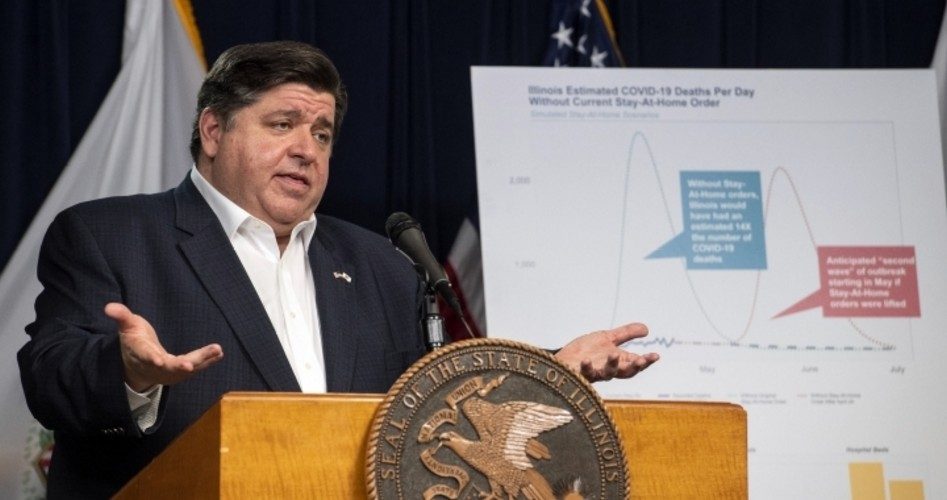
Under the threat of the Supreme Court’s enjoining his executive order limiting church services to 10 or fewer people, Illinois Governor J.B. Pritzker (shown) removed the restrictions Thursday, replacing them with nonbinding “guidance.”
“Having received many plans and ideas from responsible faith leaders, [the Illinois Department of Public Health] has reviewed many detailed proposals and has provided guidance, not mandatory restrictions, for all faith leaders to use in their efforts to ensure the health and safety of their congregants,” the Democratic governor said at a news briefing.
The state’s nine-page guidance document suggests that churches stick to online and drive-in services. If they choose to hold in-person services, however, they are asked to congregate outdoors or in small groups indoors, to practice social distancing, to require congregants to wear masks, and otherwise to participate in coronavirus theater.
Pritzker announced the change just hours after two Romanian churches, Elim Romanian Pentecostal Church and Logos Baptist Ministries, filed a request with the Supreme Court for an emergency injunction pending appeal — and fewer than four hours before Justice Brett Kavanaugh’s deadline for Pritzker to respond.
The churches have been openly defying Pritzker’s order and, represented by Liberty Counsel, suing him over it. After a federal judge denied the churches’ request for an injunction against Pritzker’s order, the churches appealed to the Seventh Circuit Court of Appeals.
On May 22, the churches received hand-delivered letters from Chicago’s health commissioner threatening them with “summary abatement” — which could include razing their buildings — if they continued to defy Pritzker. The churches, some of whose members have firsthand experience with totalitarian regimes, asked the Supreme Court for the emergency injunction, a request that almost certainly caused Pritzker to change course.
“The unilateral actions of Gov. J.B. Pritzker is [sic] the classic example of tyranny. He knew he did not have authority to trample on the First Amendment rights of churches and houses of worship, but he did anyway and continued to do so until his case reached the U.S. Supreme Court,” Liberty Counsel founder and chairman Mat Staver said in a statement. “He cannot be trusted to obey the Constitution. The fact that he recently said that churches would never get above 50 people for at least 12 to 18 months, and now a few hours before he had to file with the Supreme Court he removes all restrictions, illustrates that he had no basis for the orders in the first place. The only thing that changed was he was dragged to the steps of the U.S. Supreme Court. While we are happy that all churches and houses of worship no longer have any restrictions, we want to make sure this tyranny and abuse never happens again.”
After Pritzker made his announcement Thursday, he asked the Supreme Court to declare the churches’ injunction request moot since the order it challenged was no longer in effect. Liberty Counsel responded with a brief asking the court to rule on the request anyway.
“The Governor’s sudden change has no permanency or force of law, and both his public statements and his new policy strongly signal an impending return to his old ways,” reads the brief. “Absent a pronouncement from this Circuit Justice, or the Court, there can be no reasonable expectation that the Governor will not once again infringe Churches’ constitutional rights.”
The court accepted Pritzker’s argument and declined to rule on the request. However, the court said that the churches could file a new motion “if circumstances warrant.”
“The Supreme Court made clear that if Gov. Pritzker changes course and reimposes restrictions on houses of worship, the doors of the Court remain open,” Staver said in another statement. “This is a shot across the bow to any governors that if they violate the First Amendment right of houses of worship, the Supreme Court is watching and ready to remedy these unconstitutional actions.”
Or is it? On Friday, the court denied a similar emergency-injunction request from a California church on its merits. That decision may well embolden Pritzker to make his church restrictions mandatory once again, particularly if a “second wave” of COVID-19 occurs (or is claimed to occur). Illinois Christians will need to remain vigilant lest their liberty be doubly jeopardized.
Photo: AP Images
Michael Tennant is a freelance writer and regular contributor to The New American.



